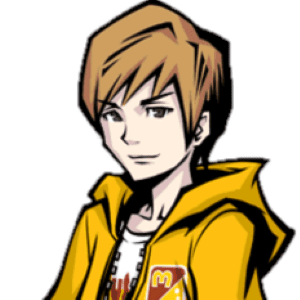Visual novels have always been on the fringes in the western gaming market, and it’s not hard to see why. Aside from a notable portion of them being rather consistently… inappropriate for good company, it is easy to see why a game genre based on reading a story would simply have less appeal when other games provide stories of their own on top of giving novel mechanical experiences to convey them through. Whether this line of thinking is correct or not though, there is one visual novel series which has remained a constant icon of gaming culture even despite its turbulent shifts in quality: the Ace Attorney series. Not only did this series make playing the role of a defense lawyer of all things feel fun and heroic, its sense of style is wholly unforgettable and burned into gaming’s collective unconscious. But rather than touch on any of the main series titles, today I wanted to look at the most recently localized spin-off titles, which are conveniently bundled in a collection. Court is in session everybody, all rise.
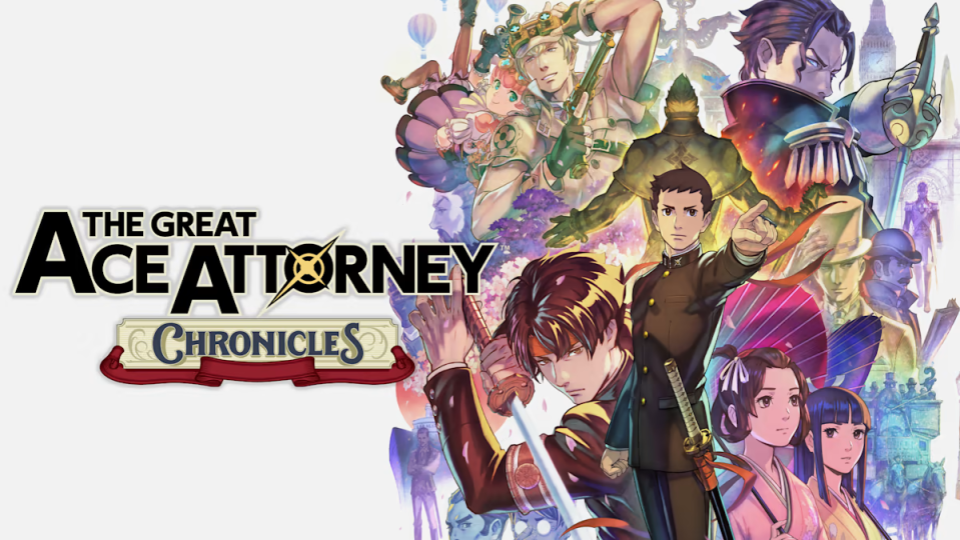
Developed and published by Capcom, and released originally in 2015 and 2017 before finally coming west in 2021, The Great Ace Attorney Chronicles is a narrative adventure comedy game for PC, Playstation 4, and Nintendo Switch. Its premise involves a Japanese student of English inadvertently becoming a lawyer and taking on various criminal cases where shenanigans ensue, all while slowly becoming privy to massive secrets about the world’s most powerful empire. Players largely interact with the game through reading text, but there are aspects of interactivity like selecting correct evidence and searching environments for clues. Please note that the Steam version was used for this review.
The story of The Great Ace Attorney Chronicles takes place in the Victorian era and follows Ryunosuke Naruhodo. The beginning of the game sees the young student accused of murder, and complications force Ryunosuke to defend himself in Japan’s highest court. This inflection point cascades into a wild adventure which will take him across the globe to England under even stranger circumstances, and get him mixed up in the empire’s legal affairs. Seeing as the game is about its story before anything else I really shouldn’t say much more than this, but I promise to give an extra thorough examination of the story’s quality to make up for it. The game is split into two halves which correlate with the two games in the collection: The Adventures and The Resolve, five chapters each. Discussion of the story will be structured around addressing them in order, with some final discussions about shared elements at the end.
The Adventures is probably the most unique Ace Attorney game to this day, although it takes someone familiar with the other games to see why. On the surface it is just your standard legal mystery affair in the vein of the other games but with one monumentally key difference: its structure. In the average Ace Attorney title you get an introductory case which takes place exclusively in court to hook you with the series’ signature comedic drama (dramatic comedy?), after which it fills out its runtime with cases that bounce back and forth between investigation sections and courtroom sections. The Great Ace Attorney: Adventures by contrast has two cases that take place only in court, one case that is exclusively an investigation, and the remaining two have uninterrupted investigations followed by unbroken court trials. Between these two styles, Adventures is my preferred by a country mile. While the traditional chapter structure more closely follows writing principles of rising and falling action, this alternative structure gives the game’s narrative a forward momentum towards its individual climaxes which is actively more engaging to read. Splitting the game into multiple chapters already gives the story natural points of falling action, so I’m actually quite surprised in hindsight that this structure wasn’t thought of sooner.
If that were everything then Adventures would already be among the best Ace Attorney tales to date, but it takes things one step further by having something incredibly interesting to say with its narrative. One of the series’ most recurring ideas is that a good defense layer’s means of reaching the truth is always founded upon belief in their client, and I’m 90% sure this is a heroic embellishment given to make this often maligned job market appeal. Adventures however is deeply interested in exploring this idea, examining the relationship of trust between accused and defense and the ways this can benefit and harm them. This is still a rather goofy and comedic series at heart so the answers given probably aren’t anywhere close to real commentary on legal mindsets, but it succeeds both as a justification for this attitude in other games and as a more standalone story about the importance of trusting the people you care about. This is a rare case of a long running series going into deeper examination of its own tropes without being lathered in edgy deconstructionist spite, and more stories of our age are in desperate need of that.
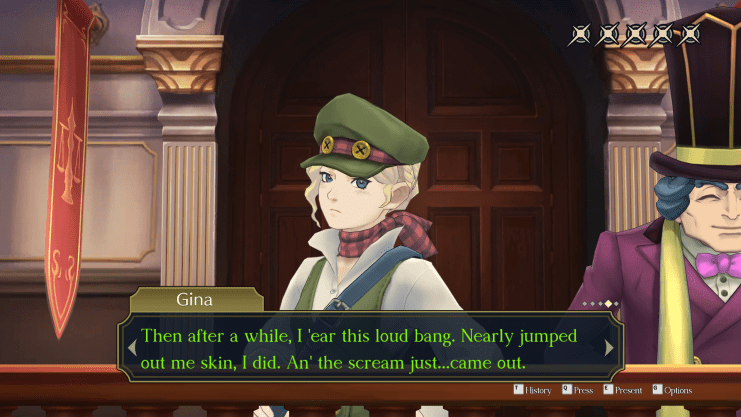
Next up comes Resolve, and coming off the heels of Adventures you can probably correctly guess that it is the weaker half of this duology. As such I am probably going to levy a lot more criticism against the game’s story, and to be fair my sore spots probably wouldn’t be so sore if Adventures wasn’t the game that preceded it. In that light let me begin by discussing the main reason why the second half is absolutely worth your time: it cleans up Adventures’ loose ends VERY well. By the time you see the credits roll, this duology feels amazingly complete. Every gun on the mantle is fired, every character has a purpose, every identity is revealed, and every secret is laid bare. Not all of these revelations are necessarily the most believable in a vacuum, but every one of them has at least some set up and payoff so I can suspend my disbelief in gratitude for its thoroughness. The series in general tends to prioritize pathos over logic ironically enough, and while I’m not sure if that’s a great thing this is one case where the pathos definitely makes up for it.
As for my complaints with Resolve’s story, there are two major ones. The first being that the structure from Adventures was abandoned in return to a more familiar chapter structure, which is a letdown but probably not worthy of a major point. What is worth noting is that the final chapter of the game is actually just a continuation of the same case featured in chapter four, meaning that the game has fewer individual cases than other entries in the series. Not that other games didn’t have four chapters as well; in fact the very first one was four chapters until they added a new one in the DS release! But when I see five chapters in the menu it’s hard not to be disappointed when I only got four stories. I didn’t aggressively hate this change, but there was a feeling in the back of my mind that we were perhaps being cheated out of an additional story. This sentiment ties into my next major complaint: the second chapter. While individual moments of chapter two can be enjoyable, the whole affair is essentially a retcon of the ending to Adventures’ fourth chapter. While characters in Resolve chapter two were teased in Adventures chapter four, unless I misread something at the end of the latter, it seems like these teasers were supposed to set up a different tale, or at least a tale where Soseki Natsume wasn’t directly involved again. I’m guessing a combination of budgetary constraints and the developers feeling emboldened to make changes by the two-year release gap have something to with all these issues, but these issues brought down my enjoyment of the story noticeably regardless of the whys.
To finish the story discussion let me touch on a couple comments regarding both narratives. First of all I’d like to emphasize my mentions of comedy earlier in the article because this game is quite humorous. While I wasn’t usually laughing aloud, the various characters and their interactions with each other are over the top in a great way. In a game that frequently features murder complete with bloody crime scenes and grim photographic prints, it’s amazing how naturally the comedy fits into the game’s world without diminishing the writers’ ability to have genuinely dramatic scenes. Any lesser game would fall to tonal whiplash, but The Great Ace Attorney Chronicles is no such title. And for one final negative, in court whenever a new piece of info seemingly breaks Rynosuke’s theory he tends to immediately have a dramatic breakdown complete with several seconds of extra animation and numerous dialogue boxes of despair. While this works early on in the story when he’s not even a licensed lawyer, by the later chapters these outbursts tend to seriously add up and drag things out. Having him first take some time to consider the new information’s implications and refute it would have sped up the later sections a lot, and given him a better sense of character growth as the duology progresses. In summation, The Great Ace Attorney Chronicles has a fantastic story which might be the best material in the whole series. And considering this is a prequel with no prior knowledge needed, that makes it the perfect onboarding point for anyone interested in the games who isn’t all too sure if they’ll like the main Phoenix Wright games. I don’t think I’ll give the duology full marks in narrative simply because there were a lot of annoying things in Resolve that hold it back for me, but my commendations are high nonetheless.
Moving along to the gameplay side of things, the basics of the game are quite simple. Read the story, observe the environment, find the contradictions, repeat until the credits roll. It’s not much in its individual pieces, but in practice the way in which these tasks are accomplished is rather refreshing. In the courtroom things boil down to hearing testimony, pressing the witness for further information, and cross referencing their words with the evidence in your possession. Some pieces of evidence need to be examined manually, but overall it’s rather simple. The Great Ace Attorney introduces other mechanics to alter the flow of these interrogations however, like how witnesses are often testifying in groups and sometimes you may need to point out their interest in others’ statements to find more info. The best addition by far comes later into the game with the jury system. In a macro sense they more or less serve as a visualization of how convincing the cases for and against the defendant are at any time, but once they all swing guilty you have an opportunity to persuade them to continue the trial. The mechanics are essentially the same as cross-examination but with the twist that evidence’s role is overtaken by pitting contradictory jurors against each other. A fun challenge each time it comes up.
Exploration sections involve finding evidence in object-finder game fashion, as well as interviewing the various characters who populate your investigation sites. What you see is what you get here, although there is an additional mode of play which gives it some exciting high points. Often there will be sections where a ‘genius’ detective attempts to unravel a mystery purely by observing the way a pensive witness reacts to different accusations, and it’s your task to correct his assertions. These are quite entertaining to play through, however they should have been explored more. For instance during the first chapter in which the mechanic is employed, they introduce the idea of the detective’s assertions changing as you make the proper corrections. In practice however, this is used only one time in the whole rest of the duology. It’s a small nitpick but one that definitely stuck out considering how early they planted the idea in the player’s head. Overall the gameplay is purely a means of facilitating the story, but it adds an interactive dimension which plays to the gaming medium’s strengths.
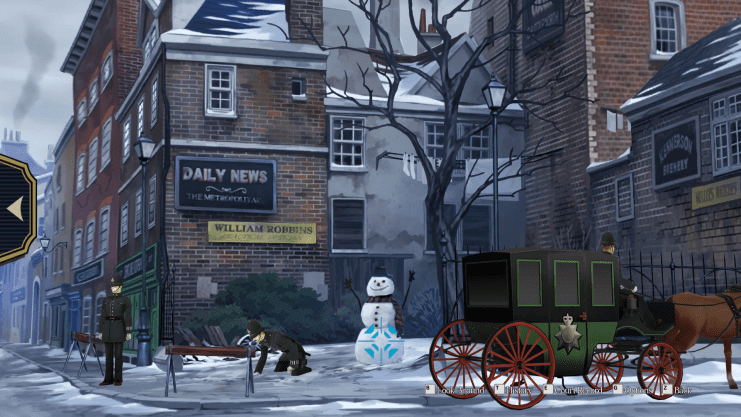
Visually speaking, The Great Ace Attorney Chronicles made their debut on the Nintendo 3DS, and echoes of that are certainly felt. The game is modeled in 3D aside from a few picture-based pieces of evidence and background art, but everything sports a painterly stylization to better match the series’ two-dimensional roots. You’re not going to be fooled by these touches into thinking its’ 2D, but the effect is really pleasant to look at regardless. Sadly since this is an older game from a handheld console, some of the graphics don’t quite hold up when presented on a monitor, and I’m sure this goes double for television. It’s not unsightly, but it does give off the impression that this art’s peculiarities were meant to be masked by a smaller screen. Beyond all of this though, I would say that the overall art direction is very well done. Exploring the streets of Victorian London gives off a perfect balance of wonder and groundedness, and every character is designed memorably in their own way (even if there is a somewhat distressing lack of subtlety which makes certain plot twists way too easy to see coming). And I would be remiss if I didn’t mention that Ace Attorney’s signature animation was on point. In fact this game features some surprisingly complex sequences of animation for the most critical moments, further adding to their impact. It’s very much a good looking game overall, it just has a few wrinkles with its age.
One thing that isn’t going to age however is the music, because the soundtrack of The Great Ace Attorney Chronicles is nothing short of legendary. The game uses a classical orchestral style score as its main foundation to really sell its late 1800s early 1900s setting, with the genre of individual leitmotifs varying to match the subject situation or character. The score as a whole is filled with many short 60-ish second loops, however the game is constantly switching between various music tracks since basically all of them are triggered by the player advancing the text boxes. This means that most songs aren’t going to be heard for long periods, so the composers could focus on getting as much detail and personality with each tune. This unsurprisingly pays off immensely, to the point where many of the loops ARE fun to listen to even outside the game. These techniques are not unique to this particular spinoff, but the dedication to the more classical instrumentation takes the main series musical ideas and really makes them shine. If it were up to me I’d make every new Ace Attorney game a period piece just so we could get more in the vein of this duology’s score, because it really is that good.
Lastly in terms of moral wisdom that we can reflect upon as Catholics, I would actually say the best wisdom comes at the end of The Resolve. For all my complaints I still consider the second half of the collection worth playing just for this alone. Anyways I obviously cannot spoil anything here, but in the abstract this finale deals with the idea of painful truths. A running theme in this section is whether we are justified in staring into the darkness when the light becomes too much to bear, and whether society is better off not knowing all the details in order to maximize our welfare. Refreshingly, the game ultimately asserts that to turn away from the truth even when it is painful is to necessarily stray from the light, and as such truth is always something to confront and accept head on. To be honest I don’t even really need to put this in more Catholic terms to express its justice, especially since God is singularly The Light and The Truth. To face the truth with courage is to kneel humbly before God, and to pursue communion with God is to seek the truth. Let stories like that of Ryunosuke Naruhodo be a reminder that truth was, is, and ever shall be one of the guiding pillars of our life. Though some truths look painful in the eyes of men, all truth is pleasing to God, and that alone is worth fighting all the forces of darkness and lies for.
In conclusion, The Great Ace Attorney Chronicles is a magnificent visual novel collection that easily feels like a crowning achievement for the series. The graphics have slightly waned in the jump to bigger screens and some of the best triumphs of the first half are strangely left behind in the second half, so there are definitely issues here. But considering the exceeding quality of the narrative, humor, personality, and music on display, there is always great reason to boot up this game and read just a little bit further, all the way unto its cathartic conclusion. Even if reading isn’t your idea of a fun video game experience, I highly recommend giving this one a chance by virtue of its sheer expertice. Watching the funny lawyer solve murder cases by convincing a jury to investigate mathematical errors is entertaining, I promise!
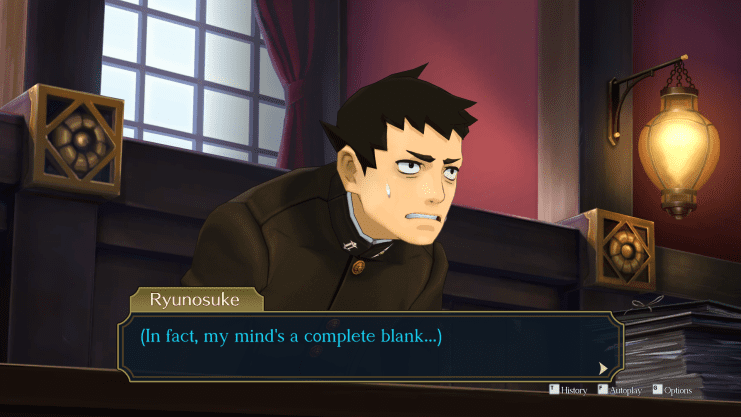
Scoring: 76%
Gameplay: 4/5
Story: 4/5
Art and Graphics: 4/5
Music: 5/5
Replayability: 2/5
Morality/Parental Warnings
The Great Ace Attorney Chronicles is a visual novel collection covering the investigations of several criminal cases, oftentimes murders. Some locations and evidence pictures feature blood, and the corpses are often photographed. The Lord’s name is used in vain a few times. Some dialogue features comments that are decidedly racist, though to be clear this is a depiction of the act and not a message from the developers to the world (it… would be weird if Japanese storytellers were racist against themselves). One of the characters runs a waxwork museum of the macabre and dresses like a witch, though there is no reference to magic outside her name. There is one scene which is set up to look eerily like a Japanese ritual suicide, but thankfully is just a grim framing for a joke. A character also contemplates suicide for real later in the story. Character design is altogether quite modest, with only a very small number of characters sporting visible chest areas (and not much area at that).
